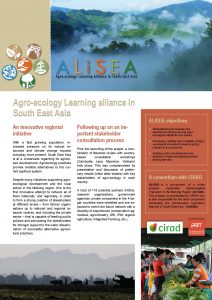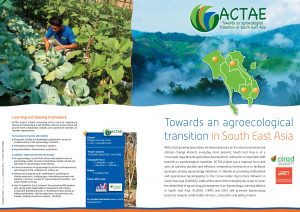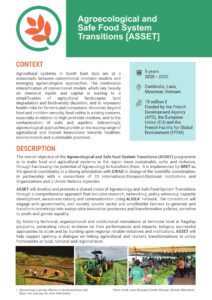
The Agroecology Learning alliance in South East Asia (ALiSEA) is supported and coordinated at national and regional level by GRET (www.gret.org). ALiSEA’s goal is to enable local and regional agroecology stakeholders to leverage one another’s expertise to produce evidence-based studies and share them broadly to support a regional transition towards agroecology. It has 3 folded objectives:
- Strengthening knowledge and experience sharing among agroecological initiatives and actors
- Increasing visibility and credibility of agroecological movement towards policy makers and consumers.
- Scaling up the development and adoption of agroecological practice among farmers.
ALiSEA is a regional platform that emerged during the ACTAE project Towards an agroecological transition in South East Asia (2015-2019 founded by AFD and coordinated by CIRAD).
Currently, the ALiSEA Network benefits from and is part of a wider program, Agroecology and Safe Food System Transitions (ASSET) project (2020-2025), funded by the French Agency for Development (AFD), the European Union (EU), and the French Facility for Global Environment (FFEM), coordinated by GRET in close collaboration with CIRAD.
ALiSEA Network gathers to date over 200 members from different backgrounds and approaches to Agroecology. It is quite unique by its diversity of stakeholders (CSOs and NGOs, Farmer organizations, Research & Academia, Private Sector, Government), its broad geographical focus (Greater Mekong Sub-Region), and its attractiveness. ALiSEA works at local and regional level alike, and currently counts four countries: Cambodia, Laos, Myanmar, and Vietnam. The website includes an interactive map with initiatives on agroecology, and an online library.
ALiSEA network aims to answer the need for a knowledge exchange and to share the wealth of experience from different regions. Through fostering a wide dissemination and understanding of the principles of agroecology, it aims to facilitate their concrete incorporation in the practices of farmers and companies, and in public policy.
Its positioning is quite specific as it promotes a broad understanding of agroecology concepts. ALiSEA helped to create a safe space for stakeholders to engage and learn from each other in regards to agroecological transition. Furthermore, ALiSEA network contributed to raise the visibility of agroecology at national and regional levels through growing media support and diverse means of communication.



